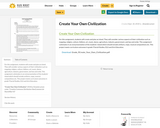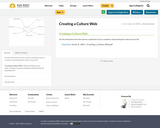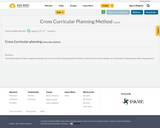
This video shows the impact of the trade in resources, ideas, peoples and diseases between the old world and the new.
- Subject:
- History
- Social Studies
- Material Type:
- Lesson
- Provider:
- Crashcourse
- Date Added:
- 05/21/2018

This video shows the impact of the trade in resources, ideas, peoples and diseases between the old world and the new.

Beginning Mondays in March, we are bringing you Crash Course Sociology. Host Nicole Sweeney will walk you through questions big and small about how we both shape societies and are shaped by them. We hope you'll join us.

For this assignment, students will create and plan an island. They will consider various aspects of their civilization such as mapping, religion, culture, folklore, art, music, dance, agriculture, industry, government, and law and order. This assignment culminates in an oral presentation of the students’ island which should include artifacts, maps, musical compositions etc. This project meets curriculum outcomes in grade 9 Social Studies, ELA and Arts Education.

Use the information from the web we created last class to complete a web showing the culture of your life.

We’ve talked about deviance more broadly, but today we’re focusing on crime, specifically in the US. We’ll start with legal definitions of crime and use FBI data to get an idea of the amount and kinds of crime committed in the US. We’ll also use that date to paint a demographic picture of who gets arrested, and explain why that’s not necessarily a full look of who commits crime. We’ll also discuss society’s response to crime in the criminal justice system, and how that response has resulted in mass incarceration.

A brief description of how I organize and plan my cross curricular class for grade 3/4 that is a mix of science, social studies, art, and health. Could be done with any grade level.

What is culture? How do we define it and how does it change? We’ll explore different categories of culture, like low culture, high culture, and sub-cultures. We'll also revisit our founding theories to consider both a structural functionalist and a conflict theory perspective on what cultures mean for society.

Sign up for a free account, allowing you access to all of Canada's National ballet School's courses and dance programs for kids.
Once you have signed up for an account, you can access the many cross-curricular dance units created by the National Ballet School. Note: If you are looking to access these units in French, please navigate to the "All course offerings" on the home page and you will find the French version of this course listed.
Great options to consider:
Grade 4: Rocks
Grade 5: Christine Friday Artist Study (Indigenous world-view)
Grade 6: Angela Gladue Artist Study (pow-wow and hip hop) (available in Cree as well)

This site introduces students to archeology -- the study of material remains to learn about past human experiences. This lesson (Grades 3-8) discusses various challenges of an archaeologist: locating a site that will yield clues about the people who once lived there, conducting excavations, and more. Students identify artifacts from a contemporary setting, describe the function of each artifact, identify methods for dating soil layers, and interpret soil profiles.

What is social deviance? Who defines what is deviant and how to people come to behave that way? Today we’re going to explore biological and psychological approaches to explaining deviance, including what each perspective can bring to the table, and their inherent limitations. From there, we’ll explain the sociological perspective and the social foundations of deviance.

Doodles Academy is a powerful free art curriculum for grades 1-5 that is available virtually. It provides art projects that offer authentic art experiences for students -- every student makes their own artistic decisions and walks away from the project with an artwork unique to them. Each project includes video tutorials and thorough lesson plans so that anyone can feel comfortable teaching art, regardless of their background or experience level. More, the art projects are aligned to topics and themes found in literacy, math, social studies, and science, so while students work through an art project they are building knowledge and context around other subjects.

We’re continuing our exploration of conflict theories with W.E.B. Dubois, who is one of the founders of sociological thought more broadly and the founder of race-conflict theory. We’ll discuss shifting ideas about race, Dubois’ idea of ‘double-consciousness’, and the modern day field of racial identity. We’ll explore the idea racial formation and discuss Dubois’ survey of African Americans in Philadelphia to look at how economic, political, and social structures affect how we perceive different races – and vice versa. We’ll also discuss the activist side of Dubois’ life as co-founder of the NAACP and editor of the Crisis, and how modern day sociologists study racial politics and racial resistance.

The official Earth Day website showcases a variety of information surrounding this impactful day. The information includes Projects, Challenges, Videos to provide background information about the our world today and challenges and projects that your classrooms can participate in to make a difference in our world now and for the future. In addition, the website has downloadable ToolKits for your classrooms.

This week we’ll see how economies can be broken down into the primary, secondary, and tertiary sectors. We’ll look at the three stages of economic revolution that brought us to the modern post-industrial era. We’ll also explore two types of economic models: capitalism and socialism.

Series of videos on Economics created by the team at Crash Course

Explore the vast library of humanities lesson plans and teacher guides by subject, theme, and grade level. Find lessons on American Heroes, Art and Culture, History and Social Studies, Literature and Language Arts.
Grade Range K-12.

Today we’ll explore the history of education as a social institution, with a specific focus on how the US organizes its educational system. We’ll look at education through the lenses of some sociological paradigms: structural functionalist approaches (including some of the manifest and latent functions associated with education), and a symbolic interactionist approach to education that shows us how self-fulfilling prophecies in educational settings contribute to differences in academic outcomes for students.

Encyclopedia Britannica Online is a fact-checked online encyclopedia with hundreds of thousands of objective articles, biographies, and videos. Students from Prekindergarten to Grade 12 can access age-appropriate, trustworthy content.

The Explora database for schools and public libraries provides a reliable source of information to complete homework and research projects and deliver robust school curricula.

"Explore History is your gateway to a world-class collection of primary sources – maps, photos, newspapers, manuscripts, pamphlets, portraits and more.
Explore the lives and history of Indigenous Peoples, British actors and musicians, as well as members of the LGBTQ2S+ community. Check out periodicals such as The Economist and The Times. This initiative will further research, teaching and lifelong learning in Saskatchewan.
All Saskatchewan residents enjoy unrestricted access to these collections thanks to the Dr. John Archer Library, University of Regina with the assistance of the University of Saskatchewan Library and the Regina Public Library.
If you have questions about these resources, contact your local library."